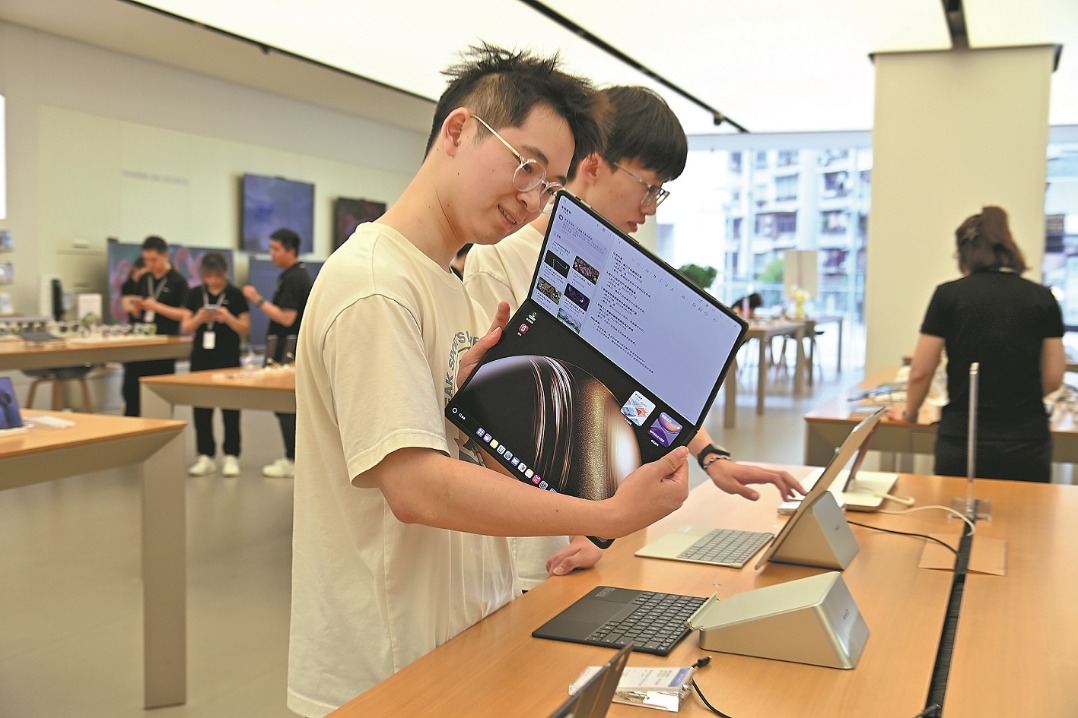GDP growth target seen as attainable
Bain & Co: Stimulus policy measures, technological innovation play key role


China's economy is expected to gain momentum and meet its annual growth target of around 5 percent this year, buoyed by stimulus policy measures and technological innovation, said Jason Ding, managing partner of consultancy Bain & Co Greater China.
The key drivers of China's economic growth come from its large-scale manufacturing, green transition, thriving innovation ecosystem and technological edge, Ding said in an exclusive interview with China Daily, adding he is upbeat about China's economic outlook this year.
"China's 5 percent GDP growth target is ambitious but achievable, reflecting a balancing act between stabilizing the economy and pursuing high-quality development."
The nation is taking the lead in leveraging disruptive technologies, such as artificial intelligence and quantum computing, and is making great efforts to promote the high-end, intelligent and green transformation of industries, with a key focus on developing strategic emerging and future industries, Ding said.
"China has set a bold objective to become the global leader in AI by 2030. By 2030, AI could potentially add $600 billion to China's economy annually," he said, adding that the country prioritizes specific industrial applications of AI, with rapid commercialization in fields such as healthcare, manufacturing, finance and smart living.
China has put forward the Global AI Governance Initiative, which signals its commitment to international cooperation in AI governance, Ding said.
"This initiative outlines China's approach to AI governance from the perspectives of development, security and regulation, contributing to the construction of a global framework for responsible AI development. All the multinationals cannot ignore China. They have to be engaged in China and also win in China to truly become global leaders. Our company is also very committed to investing and growing with our clients in China."
Noting that driving domestic consumption is one of the top priorities for China to spur economic growth this year, Ding said about 100 million households will enter the middle-income group in the next 10 years, fueling demand for premium goods like smart electric vehicles, home appliances, education and healthcare.
Moreover, the "experience economy" is gaining growth momentum as young Chinese consumers seek emotional fulfillment through the purchase of blind boxes and enjoying immersive tourism, which drives 20 percent year-on-year growth in niche segments, he added.
Ding said China's third and fourth-tier cities, where the growth of per capita disposable income is higher than that in the biggest cities, are becoming hot spots for domestic brands and value-for-money consumption.
The company will deepen its presence in China and believes there are still vast opportunities, he added. "Many local enterprises are at critical transformation stages, such as globalization and modernization. In one of the world's most competitive markets, we're here to help them thrive."
The National Bureau of Statistics said China's GDP expanded 5.4 percent year-on-year in the first quarter, beating market expectations and marking a good start to the year despite the impact from US tariffs.
The country remains steadfast in its commitment to opening-up, and has pledged to attract increased foreign investment in sectors such as medium and high-end manufacturing, further streamline market access, and foster an open, inclusive and transparent business environment for enterprises from around the world.
"China will continue to play a crucial role in driving global economic growth and safeguarding the security and stability of global industrial supply chains," said Zhang Jianping, deputy director of the academic committee at the Chinese Academy of International Trade and Economic Cooperation in Beijing.
Its heightened efforts to promote high-standard opening-up and stabilize foreign trade and investment — such as the shortened negative list for market entry and pilot free trade zones — have created favorable conditions for foreign businesses to invest in China, Zhang said.
fanfeifei@chinadaily.com.cn




































